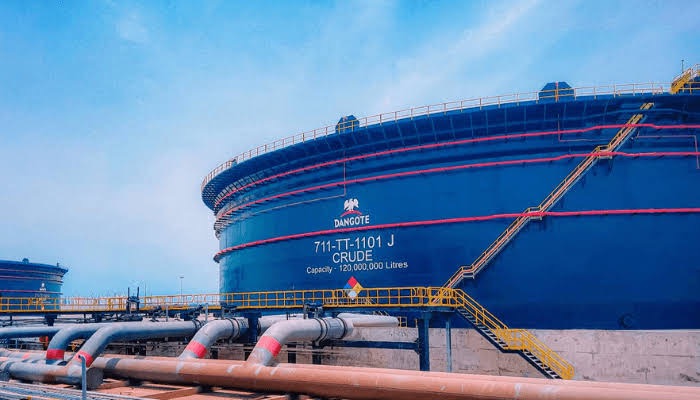Nigeria’s Dangote refinery has made a historic move by exporting its first jet fuel cargo to Europe.
This signals a significant milestone in the global energy market and showcasing the rapid operational expansion of the massive facility.
According to a Friday report from S&P Global Commodity Insights, BP is currently transporting 45,000 metric tons of jet fuel from Dangote refinery to Rotterdam aboard the Doric Breeze.
This is export marks the refinery’s debut in the European market following a substantial 120,000 mt tender.
S&P Global Commodity Insights gives complete view of global energy and commodities markets enables our customers to make decisions with conviction and create long-term, sustainable value.
“BP cargo” refers to the shipment of jet fuel that British Petroleum (BP) has acquired and is currently transporting, according to a report.
In a groundbreaking development that could reshape global energy dynamics, BP has taken the lead, transporting 45,000 metric tons of jet fuel to Rotterdam, signifying a pivotal moment for the new 650,000 b/d complex.
The shipment, loaded from Lekki on May 27, underscores the refinery’s rapid production scale-up and its compliance with European jet A1 standards, setting the stage for a potential shift in West African trade flows.
“Two sources confirmed that the Doric Breeze ship marked the inaugural BP cargo, loading 45,000 mt of supply from Lekki May 27, according to S&P Global Commodities at Sea data.

“Cepsa also secured part of the tender, with the Spanish refiner expected to deliver supply to the continent imminently, traders said.
“Neither of the companies were available for comments on purchases of jet fuel from the refinery, while a representative from Dangote previously confirmed to S&P Global Commodity Insights that the refinery has complied with European jet A1 standards since the product first started being shipped within Africa in April.
“The inaugural European shipment demonstrates the growing reach of products from the 650,000 b/d Dangote refinery as it has rapidly ramped up operations and aims to shake up established West African trade flows.
“Dangote has exported six jet fuel/kerosene cargoes starting April 8, with all material delivered to Senegal, Togo or Ghana, according to CAS data. BP is also expected to continue supplying jet fuel to the West African market with product from the refinery,” sources said.
European traders cautioned that fresh jet fuel flows could exacerbate existing weakness as Nigerian supply makes its way into a highly saturated market.
According to Platts assessments from Commodity Insights, CIF Northwest European jet fuel cargoes fetched a premium of $52/mt to the front-month ICE LSGO contract May 29, down $3.25/mt on the day and $11.25/mt on the week.
With ample supply weighing on the European market, the arbitrage window from the Persian Gulf was firmly shut.
The spread between the CIF NWE June and July contracts move into a contango of minus $1.50/mt May 29. The contango structure, reflecting prompt market weakness, was last assessed lower April 25, when Platts assessed the second-month contract at a $1.75/mt premium to the front-month equivalent, Commodity Insights data showed.
The refiner’s export portfolio could soon be reshaped as it has pursued ambitious timelines for further unit ramp-ups.
To date, Dangote has exported naphtha, fuel oil and gasoil to markets in Europe, Africa and Asia, though naphtha exports could soon be curtailed to prepare for gasoline production, a representative for Dangote told Commodity Insights May 20.
Dangote has been seen pushing around four cargoes of naphtha each month to Europe since April, even though volumes could soon be curbed to boost domestic supplies for gasoline blending, once the plant’s fluid catalytic cracker is operational.
“Dangote is now projecting its first gasoline supplies to begin in June, a spokesperson said May 20, revised from a previous May deadline. Meanwhile, the refiner has aimed to produce ultra low sulfur diesel eligible for export to Europe by the third quarter,” a representative for Dangote said in April.
Commodity Insights analysts have maintained forecasts for gasoline supply from the refinery to begin no earlier than Q3, with the plant expected to reach steady-state utilization around 2027.
In its steady-state, Dangote is expected to yield 9% jet fuel, equating to around 45,000 b/d at 80% utilization, though early supplies from the refinery could make Nigeria a net jet fuel exporter for the first time by as early as fourth-quarter 2024.
Barring any last-minute change in plan, the $20bn Dangote Oil Refinery would be listed on the Nigerian Stock Exchange by December 2024, Chairman of the Dangote Group, Aliko Dangote, said Tuesday.
According to a report, Commodities at Sea (CAS) is a high-frequency market intelligence service that provides visibility into commodity supply, trade activities, trade relationships, and fleet analytics.
CAS reports the cargo volumes and voyage details for waterborne globally traded commodities that are moved on larger tankers or bulkers. It also provides detailed analytics on trade flow trends and fleet metrics.
Olaitan Ibrahim